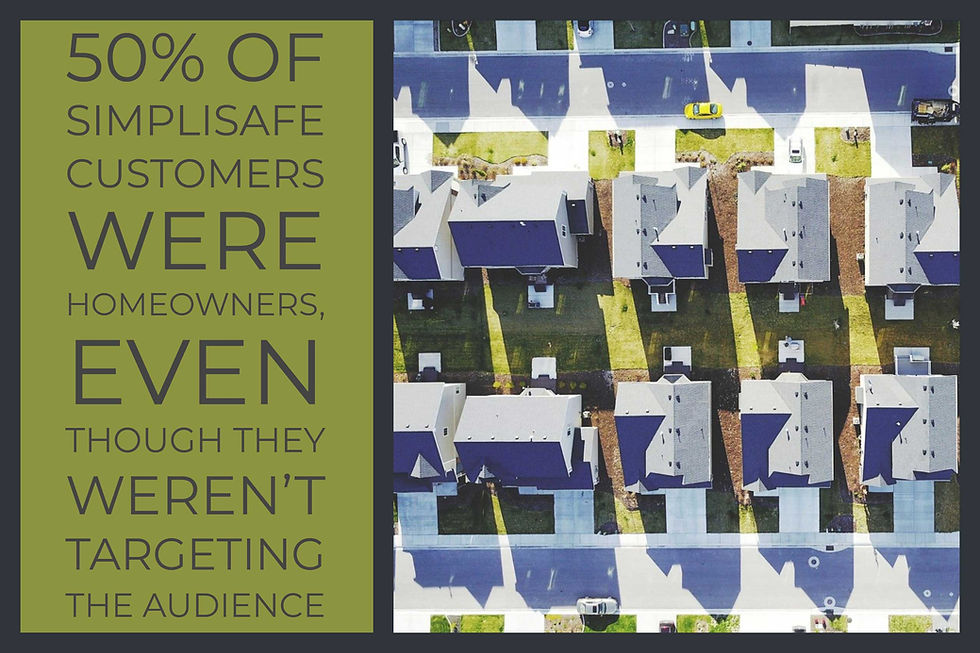The secret to great marketing
- Badon Hill Group
- Dec 6, 2019
- 3 min read
Updated: Dec 7, 2019
Great marketing is easy to achieve, yet it is elusive for many brands. The most significant barrier to having your marketing pop is making assumptions on who your target audience is. You can't target everyone, but you can sell your product or service to anyone. Once you truly know your audience, the path to great marketing is a lot less steep.
Whether you're selling business-to-consumer (B2C) or business-to-business (B2B), buying decisions are made at an emotional level. To make an emotional connection with your audience, you need to understand three things:
What would be their perfect day, as it relates to your product or service
What causes worry and stress in their life, as it relates to your product or service
What is their reward system, and how can your product or service help them reach their goals
That's it. It is that simple.
Case Study: Simplisafe
Simplisafe started this ad campaign on February 3, 2019. This style of ad is called a blatant in advertising because the message is unmistakable. This spot has a clear message about reducing stress in the life of the target audience. The target audience is also evident. They are a male, in their late 30s to early 40s, married with children, homeowner, who lives in the suburbs near a major city.
The ad shows a montage of modern-day stressors. The person at the center of the story is visibly stressed, and in an unnerving comedic moment, his spouse joins him in his fears. However, our brand has a solution. "Simplisafe on."
"Because home is a place where you should simply feel safe."
The message? Life and the world outside is uncertain and scary, but we can help you feel safe in your own home.
We know what the Simplisafe target audience is not just from the ad, but by the words of Chad Laurans, CEO of Simplisafe. Simplisafe started by targeting renters, not homeowners, with a mission of "Home security for city living." The company floundered for two years until Laurans architected a turn around plan.

They researched their existing customer data and learned that they were targeting the wrong audience. Despite going after renters aggressively, 50% of Simplisafe customers were homeowners. The company pivoted in 2010, and the rest is as they say history.
In the Simplisafe case study, the problem wasn't with the positioning. The problem was that the message was targeting the wrong audience.
When they launched in 2008, they didn't fully take into consideration other aspects of apartment living and the demographics of their audience. Their target audience was based on opinions through personal experience. Although the emotional connection of feeling safe at home is essential for many, apartment security is more stringent than for a single-family home. Having a security system for apartment owners wasn't as top of mind, and that hurt sales.
An additional point, this is a solid example of, "You can't target everyone, but you can sell to anyone." Masked in their data was half of their sales were coming from an audience they weren't targeting. Once they made the business pivot, Simplisafe became a household name.
The formula for marketing success is simple. Have a deep and accurate understanding of your target audience's demographics, perfect day, fears, and reward system. Next, demonstrate how you can help them achieve their goals and create an emotional connection to your brand. Finally, equip them with the information they need to make an informed buying decision.
All of these pieces need to be linked together to move your audience through your funnel effectively. Measure your success and be willing to change directions if the data shows you're missing the target.
Badon Hill Group believes that big business marketing should be available to everyone. We specialize in identifying your target audiences, building emotional connections, and creating content that earns trust. Contact info@badonhillgroup.com to start a conversation on how we can help you be successful.




Comments